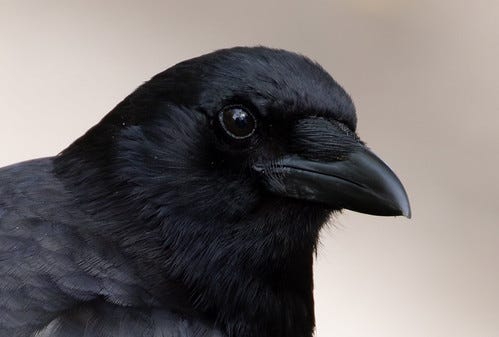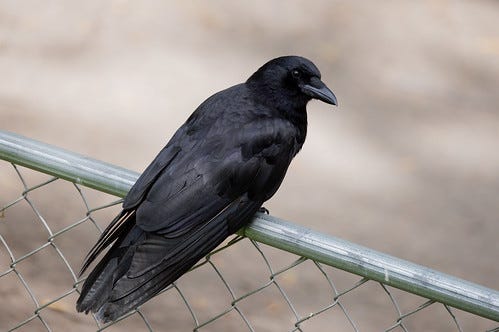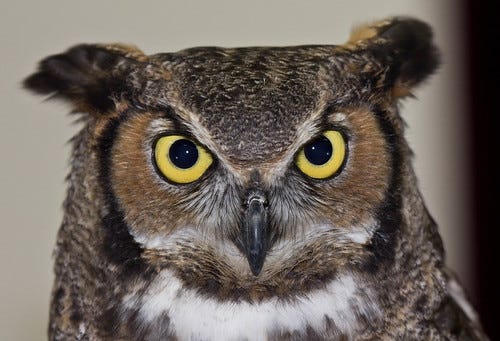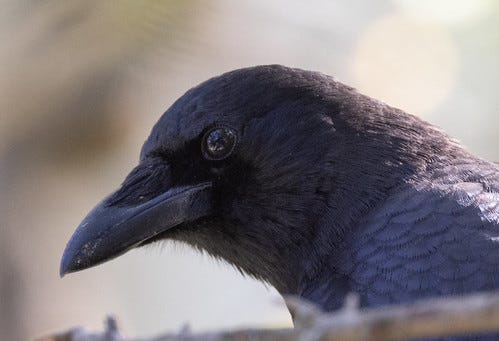Let's Talk Crow
How can we possibly think we can communicate with non-human life forms from other galaxies when we can't communicate with intelligent carbon-based life forms right here on earth?
(Listen to the radio version here.)
First of all, the good news: The crow I found in my backyard and brought to our local rehab facility, Wildwoods, and then transported to Wild & Free in Garrison, is doing well. I’ve offered to transport it back to my neighborhood when it’s ready, and will post updates as I know more.
My post about it got the attention of one of my birding friends who just happens to live next door to my grandson Walter. Bruce wondered about crow communications:
For those of us who like to sleep until 6-6:30 with windows open, the morning caw-caphony is hard to take. And they seem to keep it up all day. Is it just the young crows begging? Or learning to communicate with each other? For a while we thought they were mobbing something, but it's currently every day and there's no evidence of anything being mobbed.
During the extended time when nestlings and recent fledglings are begging every year, crows are very noisy. The young ones have very distinctive calls, nasal without the raspy quality of adults; they seem to lose those baby tones by early fall. I don’t know if young crows have a “babble” stage like young humans. Usually when I’m seeing crow families they don’t seem to engage in small talk, but I’m no more certain about that than I am anything else with regard to corvids.
In my neighborhood, crows tend to make short vocalizations—nothing extended like what Bruce is hearing—except when a predator is near. If the predator doesn’t skedaddle, they keep up the cawing.
Their caws regarding a fox, cat, or other mammalian predator can seem to go on and on, but not with the intensity of them mobbing an owl, and not attracting the enormous gatherings that their owl-mobbing calls elicit. Mammals are dangerous for unwary crows near the ground, but don’t pose the level of widespread danger that a Great Horned Owl does.
When I walk around Bruce’s neighborhood with my grandson Walter, I often notice a cat hanging out a couple blocks north of his and Bruce’s house. I wonder if that’s what Bruce’s crows are cawing about. Or it could be a whole lot of other possibilities. One of the crows—a fledgling or adult—might be injured or sick and the others are expressing concern, giving wanted or unwanted advice, bringing over casseroles... It’s impossible for a mere human to say.
As recently as twenty years ago, people did a lot of generalizing about the contexts in which various crow vocalizations are made, but we now realize we haven’t scratched the surface as far as pinpointing specific situations eliciting most of their calls, much less being able to attach meanings to each sound. Except for a few “assembly calls” alerting crows far and wide to mob an owl, and begging calls of young crows, we really don’t have much of a clue how to interpret crow vocalizations.
Most people think we’re smarter than crows, but Henry Ward Beecher knew better. I’ve misquoted him in the past—what I thought were his own words were actually paraphrased—but Todd White, a splendid artist, historian, and book designer who prints beautiful work “under the Sign of the Two Ravens” researched Beecher’s original words about crows, and found something close in the January 1871 edition of the People’s Literary Companion, attributed just to “Beecher.” Todd White’s colleague at Duluth’s own College of St. Scholastica, my dear friend Brad Snelling, confirmed that “Beecher” was indeed Henry Ward Beecher. (You can read Todd’s splendid post about tracking down this quote on his website.)
THE CROW. – Aside from the special question of profit and loss, we have a warm side toward the crow, he is so much like ourselves. He is lazy, and that is human; he is cunning, and that is human. He takes advantage of those weaker than himself, and that is man-like. He is sly, and hides for tomorrow what he can’t eat today, showing a real human providence. He learns tricks much faster than he does useful things, showing a true boy-nature. He thinks his own color the best, and loves to hear his own voice, which are eminent traits of humanity. He will never work, when he can get another to work for him—a genuine human trait. He eats whatever he can lay his claws upon, and is less mischievous with a belly full than when hungry, and that is a man. He is at war with all things except his own kind, and with them when he has nothing else to do. Take off his wings, and put him in breeches, and crows make average men. Give men wings, and reduce their smartness a little, and many of them would be almost good enough to call crows.
It's in many ways meaningless to compare intelligence between species, or even between individual humans, but crows are certainly among the most intelligent and human-like of carbon-based life forms in the known universe. If we haven’t figured out what their vocalizations mean, much less how to engage in a two-way conversation with them, how can we even begin to imagine communicating with beings from other solar systems? I bet crows aren’t arrogant enough to think they can do that. Or are they? Until we learn to communicate with them, we’ll never know.







Love my In the Company of Crows and Raven's and The Gifts of the Crow by John Marzluff and Tony Angell, and The American Crow and the Common Raven, especially for Crow cognitively and intelligence. Jennifer Akerman's books discuss this well, as does Candice-?, I think, in Bird Brains (?), though I don't have that. I counted 14,000, and 26,565 at the Allentown, Pennsylvania winter roost here and have heard of more. I started a roost blog, allentowncrowroost.wordpress.com, if you and your readers are interested in a local roost status. I don't have the email address working yet for people to submit counts and other information, and the counts, but I discuss the relationship between roost count growth and area sprawl growth, and will get that corrected and put in a bit about Crow cold temperature survival and their metabolism, called the science of avian energetics. It's a more scientific site though, perhaps more appropriate for those interested in ornithology.
Sorry I didn't respond about Bruce, but I guess you discovered him. Small world! And you still look great!!
Laura, thank you once again, for elevating my birding. I am always very grateful for your work.